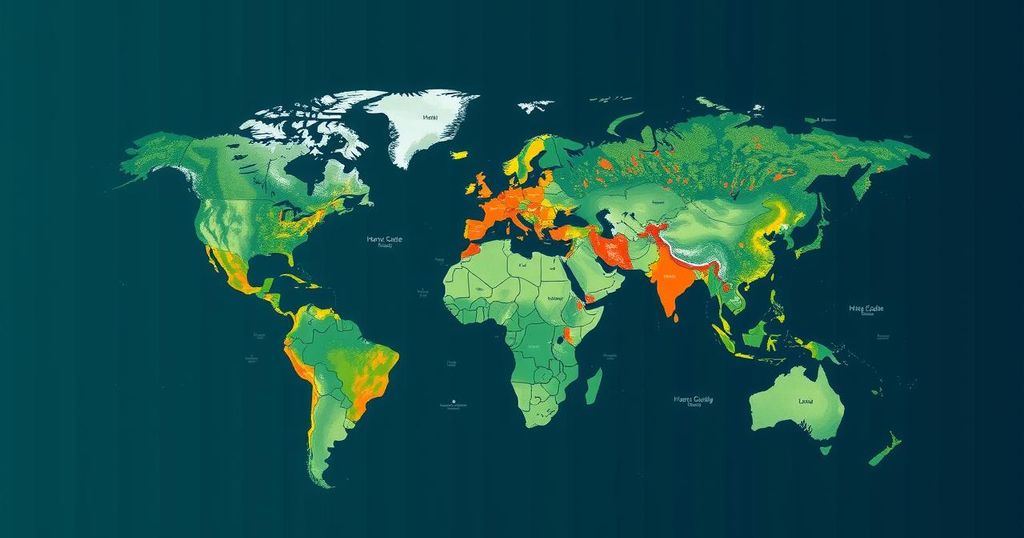Global organizations have raised urgent warnings about the climate crisis ahead of COP29 in Baku, Azerbaijan, emphasizing the need for intensified actions due to record greenhouse gas emissions. The WMO’s report shows alarming levels of CO2 and other gases, necessitating robust targets from countries as part of the Paris Agreement. China is advancing its climate strategies while urging collaboration, and the importance of climate finance is highlighted at COP29.
Global organizations are raising alarms about the intensifying climate crisis ahead of the 29th Conference of the Parties on Climate Change (COP29) scheduled to take place in Baku, Azerbaijan from November 11-22. Reports from the World Meteorological Organization (WMO) and the United Nations Environment Programme (UNEP) emphasize the urgency for heightened efforts to combat climate change.
The WMO’s latest Greenhouse Gas Bulletin reveals a record surge in greenhouse gas emissions in 2023, indicating that carbon dioxide levels have reached 151 percent of pre-industrial levels, with methane and nitrous oxide levels at 265 percent and 125 percent, respectively. WMO Secretary-General Celeste Saulo remarked, “Another year, another record. This should set alarm bells ringing among decision-makers.” The direct correlation between these rising emission levels and the increasingly severe weather events is demonstrated through a study by World Weather Attribution which links significant meteorological disasters since 2004 to global warming.
In light of current climate challenges, it is crucial for countries to leverage COP29 to set robust nationally determined contribution targets as outlined in the Paris Agreement. The 2024 UNEP Emissions Gap Report stresses the importance of these targets, stating that failure to implement strong commitments could lead to a rise in global temperatures by 2.6-3.1 degrees Celsius this century, with catastrophic global implications. UNEP Executive Director Inger Andersen remarked, “I have urged the international community to step up action on climate change and set stronger nationally determined contribution targets to strive to limit temperature rise to 1.5 degrees Celsius.”
Particularly, China has committed to advancing its national strategies for addressing climate change, recently publishing the Action Plan on Early Warning for Climate Change Adaptation (2025-2027) during COP29. This plan aims to enhance early warning systems and climate adaptation capacity in light of the increasing threat from extreme weather. Furthermore, China is advocating for collaborative risk assessment efforts and the establishment of a global early warning network. China’s climate envoy, Liu Zhenmin, has expressed a commitment to controlling methane emissions and urged the U.S. to engage in constructive dialogue regarding climate issues.
At COP29, UN Climate Chief Simon Stiell emphasized the necessity for an ambitious new climate finance target to benefit all nations, particularly the wealthiest and most influential.
The current moment marks a critical opportunity for global collaboration in combatting climate change. With effective mobilization, nations can work together to mitigate the impacts of climate change and transition toward a more sustainable future.
The climate crisis has escalated to unprecedented levels, prompting global organizations such as the WMO and UNEP to issue urgent reports and calls to action. The ongoing rise in greenhouse gas emissions, particularly CO2, methane, and nitrous oxide, is contributing significantly to global warming and extreme weather events. The upcoming COP29 conference serves as a crucial platform for nations to renew their commitments through the Paris Agreement and outline actionable steps to combat climate change, especially given the impending deadlines for new targets set for 2025 and the rising global temperatures that could result from inaction.
In conclusion, the alarming rise in greenhouse gas emissions necessitates immediate and coordinated global action to address climate change. COP29 stands as a pivotal platform for nations to establish ambitious targets to limit global warming. Collaborative efforts, particularly through enhanced climate finance and risk assessment capabilities, are vital for fostering a resilient and sustainable future for all nations. The urgency of action cannot be overstated if humanity is to avert the catastrophic impacts projected in the absence of decisive measures.
Original Source: www.stdaily.com






